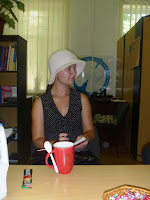One of the frequent questions that we have to prepare for when we go back to Canada is, “what exactly do you do in Ukraine?” If we think about this question while driving on the “holey” road to Tokmak we are tempted to conclude “exactly” is not a common word used here. However, we take the question to mean, “give us a detailed description of your workday but keep it short.” In this blog report we want to describe what we tend to do and what we would like to do–every day we are reminded that the two are not necessarily the same.
We would like to view needs, think of programs that would connect to the needs, enjoy the rewards of successful programs, and find artifacts and stories that broaden our understanding of what our great-grandparents did here. What we actually find ourselves preoccupied with is writing policies to ensure that students are treated equitably when receiving scholarship grants and seniors get equitable treatment on coal distribution. We also find ourselves dealing with the question, “how much holiday pay do staff qualify for?” We spend a lot of time ensuring that we meet all our tax requirements, particularly the taxes surrounding payroll, vehicle registration, gas and electrical usage, etc. Collecting taxes has become a national obsession since receiving the economic crisis loan from the International Monetary Fund. We also spend a lot of time ensuring that wherever possible we make payments through the bank–this offers much more transparency but at times it is highly inefficient. In other words, we do a lot of paper work. That’s in addition to newsletter and blog reports, emails, project proposals, etc. The thing that keeps us going is that we know that good programs can only continue if they are well documented and consistent with our mission and values. And that doesn’t come just with story-telling, it needs a lot of numbers and policy backup.



What charges our batteries is going out into the villages and finding evidence of how our forebears thrived here. This week we went out to find the Kroeker house in Lindenau. We took a 1941 map and started locating the major markers such as railway crossings, roads, forest plantations, etc. What once was a well-marked cobblestone street with well-ordered farms running perpendicular to it is now only a rutted trail with a few run-down houses. The only things running are free-range chickens and ducks–goats are tethered while dogs can only run up to the fences. There is no longer a road leading to the railway tracks, but the line of trees, the change in land grade, and some cobblestones confirmed its existence. Soon we concluded that we had found the site of the old Kroeker property.
We walked through high weeds and some tall grass, kicking up the soil, and sure enough we soon found a slight depression containing a scattering of bricks. We took pictures of the view from where the house once stood with the hope that family members in Canada could now enjoy the vista that their forebears did. The house had been on a bit of a slope and had good view of the Kolonista hill; no doubt every night they would have heard the nearby train at the end of the grain field. It was a thrilling moment. That re-energized us, after spending several hours on an Excel spreadsheet calculating all the different factors we would use to determine which students would get what amounts for their university scholarships. The twenty-five students we will support this year should be happy for the Kroeker house–after all, it gave us energy to keep doing what we are trying to do exactly.
Next weekend we hope the Star Alliance pilots will also do things exactly so we can arrive back in Canada, with more stories.
Ben and Linda
c/o Friends of the Mennonite Centre in Ukraine
3675 North Service Road
Beamsville, ON. LOR 1B1
Next weekend we hope the Star Alliance pilots will also do things exactly so we can arrive back in Canada, with more stories.
Ben and Linda
c/o Friends of the Mennonite Centre in Ukraine
3675 North Service Road
Beamsville, ON. LOR 1B1






















